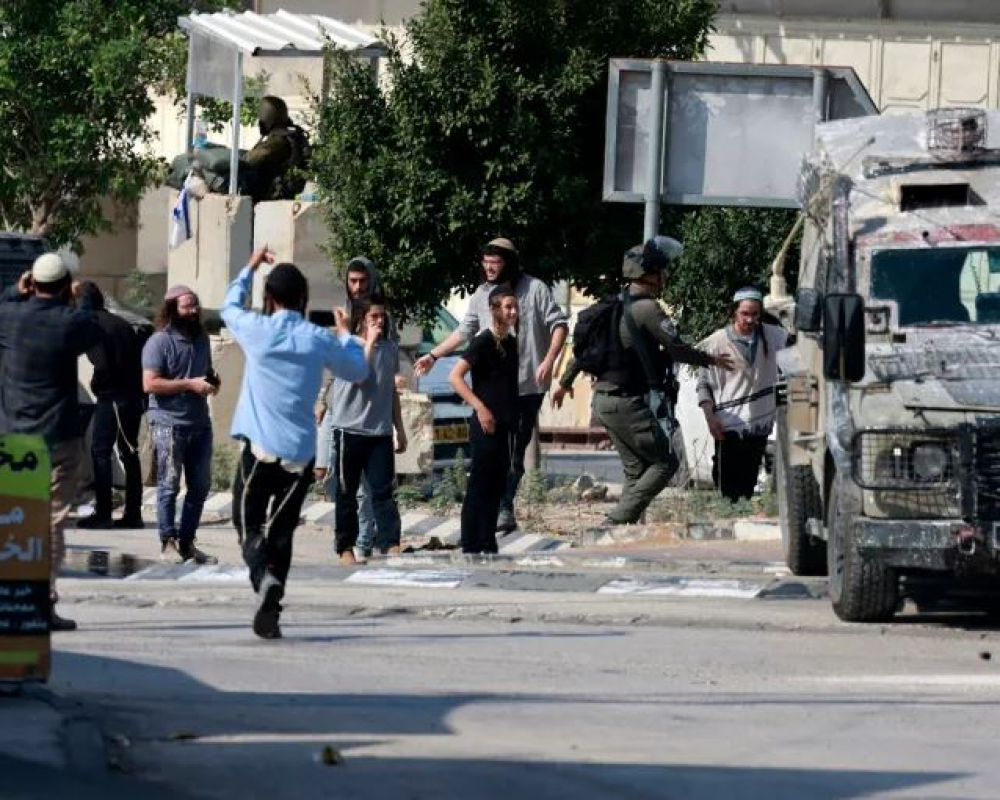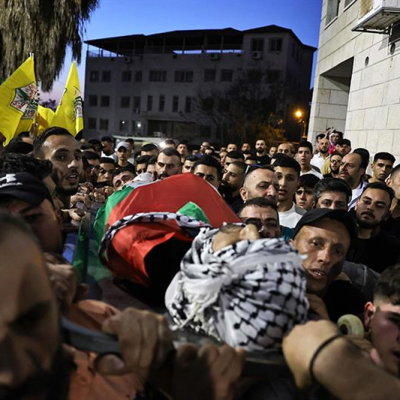
Bethlehem / PNN / Monjed Jadou wrote for Ahram Weekly,
Israel is escalating its repressive actions in the West Bank despite the danger of an explosion of local tensions and international repercussions.
Israel and its extreme right-wing government founded on principles of racism and extremism continue to escalate tensions in the West Bank, hoping to achieve on-the-ground results after the failure of the country’s eight-month war of extermination against the Gaza Strip.
Israel has employed all its political and military resources in this conflict, resulting in international court rulings condemning the country, calling for an end to its war, and urging accountability for Israeli officials. There has also been a wave of international recognition of the State of Palestine and the Palestinians’ right to establish an independent state along the lines of the 1967 borders.
This challenging political reality has driven Israeli Prime Minister Benjamin Netanyahu and his cohort of far-right ministers to intensify their campaign against the Palestinian people. They view the West Bank as a suitable arena to compensate for failures elsewhere, and this has been manifested in punitive measures against the Palestinian people and their leadership in the area.
Despite the Palestinian leadership’s efforts to maintain calm in the West Bank, even with the constraints imposed by Israel, it faces harsh criticism. Some political rivals have accused the leadership of silence or even complicity regarding the events in Gaza.
However, sources within the Palestinian leadership have affirmed their awareness of the right-wing Israeli government’s plans and the weak and even complicit stance of some Arab states towards the Palestinian cause. They are also aware of the international landscape, where the US and many other countries are siding with Israel.
As a result, the leadership prefers to maintain Palestinian resilience in the West Bank and Jerusalem as the best means to confront Israel at this stage.
The most prominent form of the Israeli escalation is the continued expansion of Israeli settlements in the West Bank, with Israel announcing that this will significantly increase on multiple fronts.
The announcement came following decisions by the International Court of Justice (ICJ) demanding that the Netanyahu government halt its aggression against Rafah. The latter has also revoked the Disengagement Law that was intended to prevent the reconstruction of Israeli settlements in the northern West Bank from which it had previously withdrawn.

Israel has now declared that it will rebuild these settlements, effectively eliminating the possibility of geographical continuity between Palestinian towns and cities on the West Bank and thus undermining the idea of establishing an independent Palestinian state through its settlement construction.
The escalation of settlement building is not limited to government decisions to build more settlements and thousands more housing units. It also includes giving free rein to settler gangs to carry out dozens, if not hundreds, of attacks against Palestinian citizens and their property, including agricultural land.
The settlers uproot and burn trees, attack citizens on the roads, throw stones, shoot, and burn Palestinian vehicles and homes.
Sixty-six-year-old Hajj Rabhi Ghafri from the village of Sinjel 21 km from Ramallah said that Israeli settlers had prevented him from accessing large areas of his land since 7 October.
They have also attacked and uprooted the olive trees he has planted. These attacks have been occurring consistently for the last 15 years, but they have intensified since the start of the war on Gaza.
Regarding his direct experience of challenging the settlements, Ghafri told Al-Ahram Weekly that settlers had attacked a piece of land he owns four times in a row, uprooting olive trees several times. In the latest incident, they broke the trees and sprayed them with corrosive substances.
After each attack, he replants the olive trees, around 50 to 60 each time, showing his determination to resist the settlements. He diligently tends his land with redoubled efforts.
“God willing, I will stay alive and remain a thorn in the side of the settlers,” Ghafri said. “I have come to recognise the settlers who carry out these attacks due to their frequent presence on my land.”

The settlers threaten him with the Israeli Occupation Forces, and when he files complaints against them, Israeli investigators treat him as if he were the accused and not the victim.
Activist Salah Al-Khawaja, involved in the popular resistance against the Israeli Separation Wall and settlements, highlighted the intensification of the settler attacks. This has ranged from decisions to build thousands of housing units and establish hundreds of illegal outposts to projects aimed at seizing tens of thousands of dunams of land alongside the theft of water resources by Israel.
Al-Khawaja said that Israel has exploited its war of extermination in Gaza to significantly expand settlements on multiple fronts. There have also been attacks by extremist settlers to whom Israel has distributed tens of thousands of firearms. Sources in the Israeli media have revealed that the Israeli army has decided to distribute more automatic rifles to settlers in the West Bank, marking the second such distribution since 7 October.
The Israeli TV Channel 7, close to the settlers, quoted a representative of the Israeli army’s Central Command as saying that “rifles will also be distributed to residents who are not part of reserve units to enhance security.”
Late last year, extremist Minister of Internal Security Itamar Ben-Gvir in the Occupation government launched a campaign to arm settlers in the West Bank under the pretext of providing protection from Palestinian attacks.
Weapons were distributed to tens of thousands of settlers and Israeli army reservists. Various Israeli political forces warned of the repercussions this step could have on stability in the area.
The Israeli escalation in the West Bank has also included announcements of measures against the Palestinian government and officials. The latest instance involved Israeli media outlets close to Israeli Finance Minister Bezalel Smotrich accusing Palestinian General Intelligence Chief Majed Faraj of “terrorism” and “protecting terrorists.”
Settler-affiliated media sites led an incitement campaign against Faraj claiming that “the terrorist Palestinian Authority is hiding the terrorist who killed soldiers in Nablus in a car-ramming attack.”
“From today, there is no need for special units, tanks, or armour. The situation in the West Bank is very simple: we need to arrest Majed Faraj, the head of Palestinian General Intelligence, until he hands over the terrorist,” they said.
Israel’s targeting of the Palestinian Authority (PA) and its desire for escalation have not been limited to settler attacks and accusations of terrorism. For years, Israel has taken measures to weaken the PA, such as pirating Palestinian tax revenues, halting transactions between Palestinian and Israeli banks, and preventing Palestinian workers from entering Jerusalem and Israel.
These actions have created a volatile situation that Israel’s security and military leadership have warned the right wing government about. Similarly, the US and Europe have cautioned Israel against these measures and demanded that the Netanyahu government release the withheld Palestinian funds.

However, it has rejected all these demands and continues to pursue escalation in the West Bank.
Political analyst Ashraf Aqqa said that Israel’s military escalation in the West Bank serves several objectives, particularly as the world is preoccupied with the genocide in Gaza.
Speaking to Ahram Weekly reporter, Aqqa explained that the primary aim behind Israel’s escalation is the Occupation government’s desire to end the Palestinian dream of establishing an independent state and to prevent discussion on this topic.
This was evidenced by the Israeli reaction to the recent recognition of the Palestinian state by three European countries based on the 1967 borders.
Other goals include solidifying Israeli control over Jerusalem, a move perceived as complete after former US president Donald Trump’s recognition of the city as Israel’s capital.
The Occupation also seeks to seize and exploit Palestinian natural resources, refuse the release of prisoners, maintain control over the Jordanian border, and expel Palestinians from Area C, which comprises about 65 per cent of the West Bank.
Israel’s broader strategy involves pressuring Palestinian citizens and the PA to create political, economic, and social instability, thereby leading to a vacuum that could increase crime and internal conflict in Palestinian society.
Such conditions could lead some Palestinians to emigrate, thus clearing the land for Israeli control.
Aqqa said that Israel aims to undermine Palestinian society and the Palestinian political system through various oppressive measures that are being accelerated through military operations and the widespread targeting of Palestinian camps, villages, and cities.
These measures should compel the Palestinian leadership to sever relations with Israel as per the Palestinian Central Council’s resolutions. Additionally, it should send a warning message to the international community that it is impossible to endure further pressures that will inevitably lead to an explosion of tensions in the West Bank.